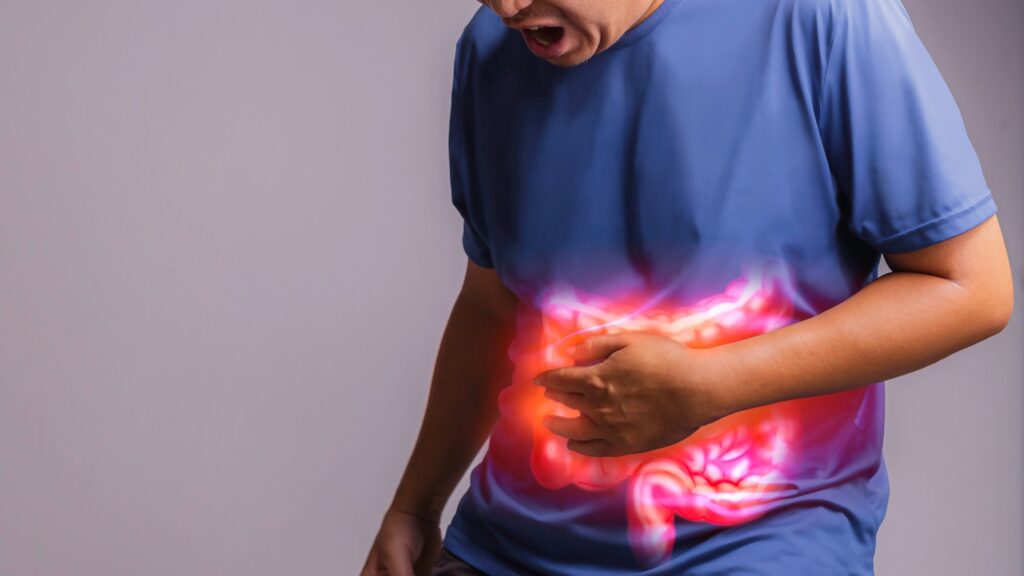Description: Gastroenteritis or stomach flu is an inflammation, swelling, and irritation of the inside lining of your gastrointestinal tract that can infect your stomach, small intestine, and large intestine.
Gastroenteritis, referred to as Stomach Flu, is inflammation or irritation of the stomach and intestine.
This inflammation leads to diarrhea, vomiting, and other complications, such as abdominal pain, dehydration, and fatigue. It can be caused by germs in the stomach (virus, bacteria, or parasite).
Gastroenteritis is highly contagious (spread through person-to-person). You can avoid spreading and catching it through simple hygienic measures like washing your hands.
Stomach Flu Symptoms
Although gastroenteritis is referred to as stomach flu, it differs from seasonal Flu (influenza), which affects the respiratory system (nose, throat, and lungs).
Stomach flu affects the stomach and intestines, which causes-
- Watery or loose diarrhea (more than three times a day)
- Nausea and vomiting
- Abdominal pain (stomach pain)
- Fatigue
- Low-grade fever
- Dehydration
- Occasionally, muscle aches or headache
Visit your doctor immediately if you notice any of the symptoms of stomach infection.
Stomach Flu Causes
Stomach infection can be caused by bacteria, parasites, toxins, and viruses. However, viruses are the most common cause of the so-called stomach flu.
Viral stomach infection is mainly caused by Norovirus (in adults) and Rotavirus (in children). These viruses primarily affect the lining of the small intestine.
Although not common, bacteria such as E. coli, salmonella, and parasites (rarely) can also cause stomach flu.
Other causes of gastroenteritis include-
- Heavy metals (arsenic, cadmium, lead, or mercury) in drinking water
- Eating a lot of acidic foods
- Toxins in food (especially seafood)
- Medications (antibiotics, antacids, and laxatives)
How do you get Stomach Flu?
Several risk factors can cause stomach flu. They include:
- Eating contaminated food or drinking contaminated water
- Being in close contact with or sharing items with someone with stomach flu
- Touching contaminated surfaces
- Not washing hands properly
- Not maintaining proper hygiene
Although stomach flu affects people of all ages, some factors can increase the risk-
- Children under the age of 5
- Older adults living in unhygienic places
- People with weakened immune systems
How to Examine If You Have Stomach Flu?
Your doctor will examine you based on your symptoms and medical history and may recommend a stool test. If the symptoms are mild, you will not need any tests.
The doctor will also evaluate your history of intake of any contaminated food or water or recent travel, or any medications used.
If your symptoms persist for a long, your doctor may examine the large intestine to determine the cause. In seriously ill patients, blood tests may be done to decide whether or not they have any water and electrolyte imbalances or difficulties with kidney function.
Stomach Flu Remedies To Stop Spreading
There is no specific diet to prevent stomach flu. However, you can prevent the spread or reduce the chance of stomach flu.
- Do wash hands properly, especially before eating
- Do not eat undercooked foods, especially meat
- Do avoid direct contact with infected people
- Do not drink contaminated water
- Do wash all fruits, vegetables, or other products before eating
Home Remedies Stomach Flu
Usually, stomach flu is not serious, and most people fully recover without complications.
Here are a few things to help relieve symptoms of stomach flu-
- Change your diet and avoid solid foods
- Drink a lot of fluids (water, juices, or oral rehydration solution)
- Use a heating pad for abdominal cramps
- Get plenty of rest
- Increase your intake of probiotic-rich foods or supplements
When to Seek Emergency Medical Help?
- Diarrhea that lasts for two days or more
- Blood in your stools (could be a sign of a more severe infection)
- Signs of severe dehydration (dry lips or dizziness)
- Diarrhea and fever for over 48 hours

